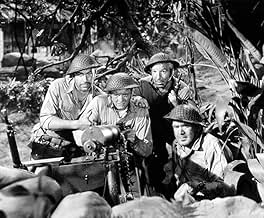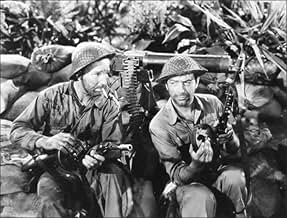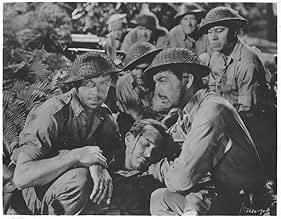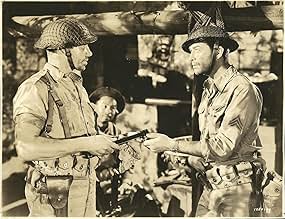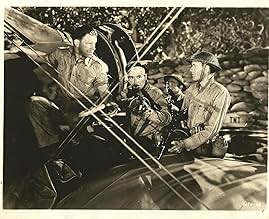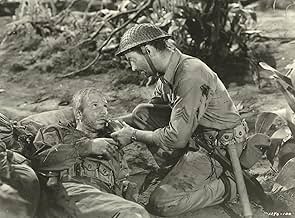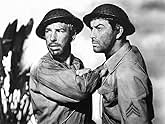अपनी भाषा में प्लॉट जोड़ेंIn 1942, in the Bataan peninsula of the Philippines, a ragtag American unit commanded by Sergeant Bill Dane attempts to blow-up a bridge in order to slow the Japanese advance.In 1942, in the Bataan peninsula of the Philippines, a ragtag American unit commanded by Sergeant Bill Dane attempts to blow-up a bridge in order to slow the Japanese advance.In 1942, in the Bataan peninsula of the Philippines, a ragtag American unit commanded by Sergeant Bill Dane attempts to blow-up a bridge in order to slow the Japanese advance.
- निर्देशक
- लेखक
- स्टार
- पुरस्कार
- कुल 5 जीत
- Yankee Salazar
- (as J. Alex Havier)
- Wounded Soldier
- (बिना क्रेडिट के)
- Japanese Soldier
- (बिना क्रेडिट के)
- Japanese Soldier
- (बिना क्रेडिट के)
- Infantry Soldier
- (बिना क्रेडिट के)
फ़ीचर्ड समीक्षाएं
Yes, you can say some of the soldiers are clichéd, but death is shown unflinchingly. Combat is portrayed as a bloody, messy, fatigue-inducing business. Boredom and endless waiting take their toll on nerves as well. The banter and cocky talk is whistling past the graveyard.
Lloyd Nolan's character is rough and unlikeable. He fights for freedom, but he fights dirty and he doesn't pretty things up with patriotic speeches. Some might complain about the black soldier playing harmonica and taking orders from white men. Actually, for the time, he was portrayed with dignity and shown to be as brave as any of the other soldiers. As for Robert Taylor, his weariness and resolve at the end are stirring and the last scene is not one you will soon forget.
Ignoring the propaganda aspects of the movie, the last half works as almost a pure horror movie, as our cast gets gruesomely picked off by unseen foes lurking in the jungle.
Exciting and gripping, it's easy to overlook the faults of this most violent and gritty of WW2 films made at the time.
"Bushido, Bushwa! You stink!" So died the heroes of Bataan...
NOTE: A previous persons comment stated that they were not even wearing American helmets. In fact, the helmets worn in the movie ARE correct for the American Army in the early 1940's.
Rather than try to show the entire evacuation and abandonment of the Phillipines, which would be perhaps overwhelmingly depressing, the film-makers decided to focus on one small, fictional incident that could, in effect, stand in for everything else. They chose wisely. What happens is that we watch a group of soldiers defend and then destroy a bridge, so as to slow down the Japanese army's advance, if only by a few hours, to buy precious time for everyone else. None of these men wants to be a hero. They're all stuck there, and would rather be someplace else. While some are more aggressive than others, no one is wholly brave; and though there is a good deal of nervousness and occasional cowardice, they all pull together admirably in the end.
Though filmed on the Culver City lot, the film cleverly and expressionistic ally suggests a tropical environment. As the story progresses the jungle gets foggier. It was never too inviting to begin with; by the movie's end it is absolutely forbidding.
The acting is variable. Some of the casting is peculiar. Thomas Mitchell plays a corporal named Feingold, but can't seem to get rid of the slight, American-style brogue that was so much a part of his screen persona. Desi Arnaz has a small role. There is a fairly straightforward presentation of a black man whose color is the least important thing about him. Robert Walker, in what I believe is his first film, has a showy role as a garrulous, yarn-spinning sailor. His character is, I imagine, supposed to be a typically charming, bumptious All-American boy, along the lines, perhaps, of Van Johnson. I find Walker,--who was an excellent actor--obnoxious in the part. Lloyd Nolan is tough as nails as a hard-case soldier with a dark past.
The movie's biggest asset in the acting department also happens to be its star: Robert Taylor. This pretty boy matinée idol gives a fine performance as the sergeant with a job no man in his right mind would want. And he is in his right mind. Taylor has no vanity in the part. He is as dirty and unshaven as everyone else in the cast, and at times shows flashes of depth and insight that are startling given his lightweight reputation. Taylor pulls the film together, with no Duke Wayne ostentation or posturing, and proves, like the film, to be stronger and truer to life than we might at first have imagined.
At least half of the story is not action but melodramatic looks at the soldiers, particularly of the squad's sergeant leader Robert Taylor and one of his men who has an attitude problem: Lloyd Nolan. We also get some shorter profiles of combat men played by Robert Walker, Thomas Mitchell and Desi Arnez (yes, Lucy's husband).
The special effects are more than passable considering they weren't too advanced in the film industry compared to today's technology. However, credibility was a little thin as those Japanese soldiers died awfully fast in those combat scenes at the end. I swear I saw several of them drop over before anyone hit them!
Taylor was the best in this movie "army" and Walker was the annoying character, playing an extremely young and generally stupid Navy guy (don't ask) who never stopped talking in this irritating voice. Other than his character, this was a tough, no-nonsense war movie.
क्या आपको पता है
- ट्रिवियाPrologue: "When Japan struck, our desperate need was time--time to Marshall our new armies. Ninety-six priceless days were bought for us--with their lives--by the defenders of Bataan, the Philippine army which formed the bulk of MacArthur's infantry fighting shoulder to shoulder with Americans. To those immortal dead, who heroically stayed stayed the wave of barbaric conquest, this picture is reverently dedicated."
- गूफ़Although the American soldier was clearly a great coconut tree climber, it is near to impossible to sit atop a coconut tree. Many Filipinos to this day fall when attempting this.
- भाव
Sergeant Bill Dane: Come on, suckers! What's the matter with you? What are you waitin' for? Didn't think we were here, did you? You dirty rotten rats! We're still here! We'll always be here! Why don't you come and get it?
- क्रेज़ी क्रेडिटClosing credits epilogue: So fought the heroes of Bataan. Their sacrifice made possible our victories in the Coral and Bismark Seas, at Midway, on New Guinea and Guadalcanal. Their spirit will lead us back to Bataan!
- इसके अलावा अन्य वर्जनAlso available in a computer colorized version.
- कनेक्शनFeatured in Toast of the Town: A Salute to Lucy and Desi (1954)
- साउंडट्रैकSt. Louis Blues
(1914) (uncredited)
Music and Lyrics by W.C. Handy
Sung a cappella and hummed often by Kenneth Spencer
टॉप पसंद
- How long is Bataan?Alexa द्वारा संचालित
विवरण
बॉक्स ऑफ़िस
- बजट
- $9,58,000(अनुमानित)
- चलने की अवधि
- 1 घं 54 मि(114 min)
- रंग
- पक्ष अनुपात
- 1.37 : 1


